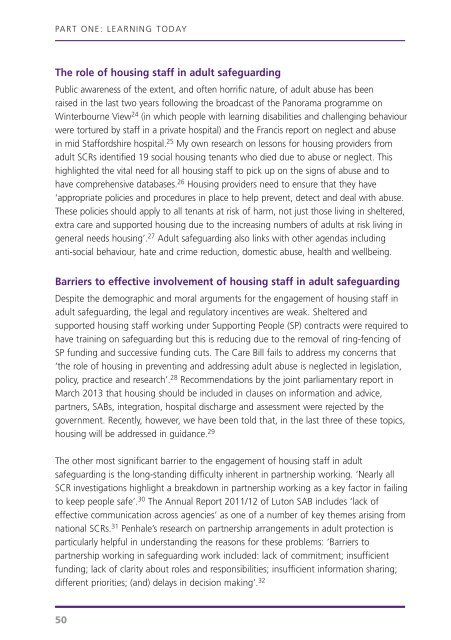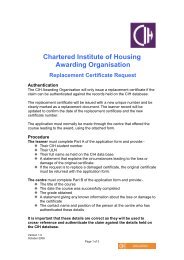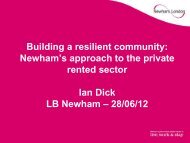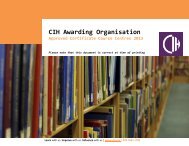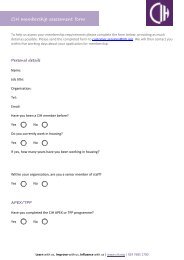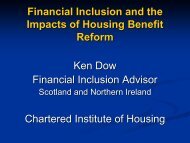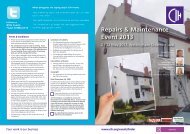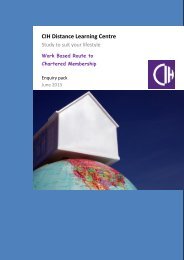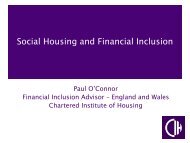View publication - Chartered Institute of Housing
View publication - Chartered Institute of Housing
View publication - Chartered Institute of Housing
You also want an ePaper? Increase the reach of your titles
YUMPU automatically turns print PDFs into web optimized ePapers that Google loves.
PART ONE: LEARNING TODAY<br />
The role <strong>of</strong> housing staff in adult safeguarding<br />
Public awareness <strong>of</strong> the extent, and <strong>of</strong>ten horrific nature, <strong>of</strong> adult abuse has been<br />
raised in the last two years following the broadcast <strong>of</strong> the Panorama programme on<br />
Winterbourne <strong>View</strong> 24 (in which people with learning disabilities and challenging behaviour<br />
were tortured by staff in a private hospital) and the Francis report on neglect and abuse<br />
in mid Staffordshire hospital. 25 My own research on lessons for housing providers from<br />
adult SCRs identified 19 social housing tenants who died due to abuse or neglect. This<br />
highlighted the vital need for all housing staff to pick up on the signs <strong>of</strong> abuse and to<br />
have comprehensive databases. 26 <strong>Housing</strong> providers need to ensure that they have<br />
‘appropriate policies and procedures in place to help prevent, detect and deal with abuse.<br />
These policies should apply to all tenants at risk <strong>of</strong> harm, not just those living in sheltered,<br />
extra care and supported housing due to the increasing numbers <strong>of</strong> adults at risk living in<br />
general needs housing’. 27 Adult safeguarding also links with other agendas including<br />
anti-social behaviour, hate and crime reduction, domestic abuse, health and wellbeing.<br />
Barriers to effective involvement <strong>of</strong> housing staff in adult safeguarding<br />
Despite the demographic and moral arguments for the engagement <strong>of</strong> housing staff in<br />
adult safeguarding, the legal and regulatory incentives are weak. Sheltered and<br />
supported housing staff working under Supporting People (SP) contracts were required to<br />
have training on safeguarding but this is reducing due to the removal <strong>of</strong> ring-fencing <strong>of</strong><br />
SP funding and successive funding cuts. The Care Bill fails to address my concerns that<br />
‘the role <strong>of</strong> housing in preventing and addressing adult abuse is neglected in legislation,<br />
policy, practice and research’. 28 Recommendations by the joint parliamentary report in<br />
March 2013 that housing should be included in clauses on information and advice,<br />
partners, SABs, integration, hospital discharge and assessment were rejected by the<br />
government. Recently, however, we have been told that, in the last three <strong>of</strong> these topics,<br />
housing will be addressed in guidance. 29<br />
The other most significant barrier to the engagement <strong>of</strong> housing staff in adult<br />
safeguarding is the long-standing difficulty inherent in partnership working. ‘Nearly all<br />
SCR investigations highlight a breakdown in partnership working as a key factor in failing<br />
to keep people safe’. 30 The Annual Report 2011/12 <strong>of</strong> Luton SAB includes ‘lack <strong>of</strong><br />
effective communication across agencies’ as one <strong>of</strong> a number <strong>of</strong> key themes arising from<br />
national SCRs. 31 Penhale’s research on partnership arrangements in adult protection is<br />
particularly helpful in understanding the reasons for these problems: ‘Barriers to<br />
partnership working in safeguarding work included: lack <strong>of</strong> commitment; insufficient<br />
funding; lack <strong>of</strong> clarity about roles and responsibilities; insufficient information sharing;<br />
different priorities; (and) delays in decision making’. 32<br />
50


